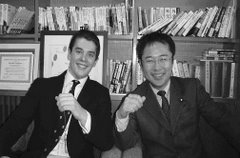
In sporting events, I am always more interested in the underdog--the forlorn hope battling against the odds--than the side that has the clear advantage. Perhaps it comes from being brought up under the indoctrination of my Scottish mother, and always having backed the 'Tartan Army' in their passionate, but generally unsuccessful, soccer, rugby or (heaven forbid) cricket matches. From a young age I found the stronger opponents boring, and would will on the weaker side--cheering the Scots against the English, or the Japanese against Brazil.
In Japanese, there is a phrase for this: 判官びいき (hangan biiki). It means, literally, 'to favour the Hangan', referring to the position held by the tragic Japanese hero, Minamoto Yoshitsune (1159-1189). Yoshitsune was a military genius and reknowned hero; and his strategic intellect led to the defeat of his family's political opponents, the Heike. However, he eventually fell out with his elder brother, Yoritomo, found himself cornered in the East of Japan, and was killed in a dramatic--and especially tragic--battle, his closest retainer riddled with arrows and his wife and daughter dead beside him.
The love of tragic heroism is something the Scots feel keenly. In 1746, the last battle fought on the British mainland, an army of mainly Highland (Northern) Scots fought--and lost to--the English for the last time at the battle of Culloden.
I have walked the fields of Culloden many, many times, and there are monuments dotted over the moors commerating the slaughter that took place. On the battlefields of Culloden, near the Highland Scottish town of Nairn, an eerie mist seems to hang in the air, and you can imagine that at any moment a ghostly army of Scottish men might come marching from the shadows, perpetually charging through the Highland winds.
On April 16th 1746, an army of more than 5000 Scots--most men in their tartan kilts, armed with only swords or spears--faced an English army twice its size with far superior firepower and organisation.
The battle was a massacre. In around 60 minutes the Scottish troops, exhausted, starving and cold, were butchered. As the Scottish army lay bleeding on the heather, survivors were put to death where they lay on the orders of the Duke of Cumberland, commander of the English army. In the chaos that followed, the Scottish leader, Prince Charles Edward Stuart, only just escaped with his life to France, part of the way disguised as a woman.
Although for many Scots the Battle of Culloden symbolises the eternal oppression of Scottish culture by the English, Culloden is also a symbol of Scottish identity. In the heroism of tragic defeat--the hangan biiki--the Scots see their national courage and bravery. The English may have won on the battlefield, many say, but they can never match the Scottish spirit.
R J F Villar
In Japanese, there is a phrase for this: 判官びいき (hangan biiki). It means, literally, 'to favour the Hangan', referring to the position held by the tragic Japanese hero, Minamoto Yoshitsune (1159-1189). Yoshitsune was a military genius and reknowned hero; and his strategic intellect led to the defeat of his family's political opponents, the Heike. However, he eventually fell out with his elder brother, Yoritomo, found himself cornered in the East of Japan, and was killed in a dramatic--and especially tragic--battle, his closest retainer riddled with arrows and his wife and daughter dead beside him.
The love of tragic heroism is something the Scots feel keenly. In 1746, the last battle fought on the British mainland, an army of mainly Highland (Northern) Scots fought--and lost to--the English for the last time at the battle of Culloden.
I have walked the fields of Culloden many, many times, and there are monuments dotted over the moors commerating the slaughter that took place. On the battlefields of Culloden, near the Highland Scottish town of Nairn, an eerie mist seems to hang in the air, and you can imagine that at any moment a ghostly army of Scottish men might come marching from the shadows, perpetually charging through the Highland winds.
On April 16th 1746, an army of more than 5000 Scots--most men in their tartan kilts, armed with only swords or spears--faced an English army twice its size with far superior firepower and organisation.
The battle was a massacre. In around 60 minutes the Scottish troops, exhausted, starving and cold, were butchered. As the Scottish army lay bleeding on the heather, survivors were put to death where they lay on the orders of the Duke of Cumberland, commander of the English army. In the chaos that followed, the Scottish leader, Prince Charles Edward Stuart, only just escaped with his life to France, part of the way disguised as a woman.
Although for many Scots the Battle of Culloden symbolises the eternal oppression of Scottish culture by the English, Culloden is also a symbol of Scottish identity. In the heroism of tragic defeat--the hangan biiki--the Scots see their national courage and bravery. The English may have won on the battlefield, many say, but they can never match the Scottish spirit.
R J F Villar


No comments:
Post a Comment